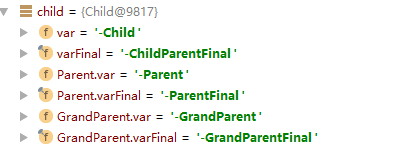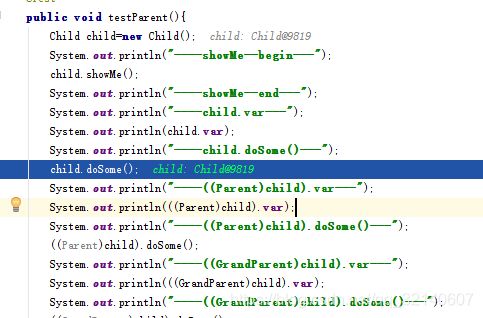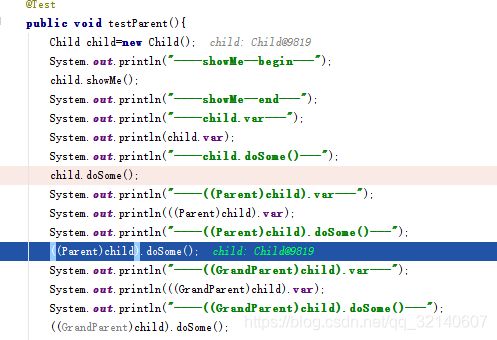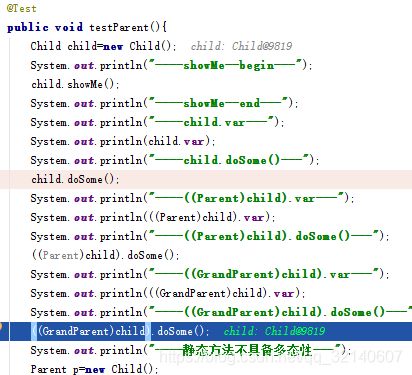java扫盲--java继承关系
抽出时间再过一遍java基础,记录自己之前没有学会或没有注意到的知识点
java继承关系相关
先说结论
1:父类声明的变量和子类声明的变量同时存在,不会直接覆盖
2:父类被重写的方法,在子类中无法访问,但变量可以
3:静态方法不具备多态性
测试代码如下:
@Test
public void testParent(){
Child child=new Child();
System.out.println("----showMe--begin---");
child.showMe();
System.out.println("----showMe--end---");
System.out.println("----child.var---");
System.out.println(child.var);
System.out.println("----child.doSome()---");
child.doSome();
System.out.println("----((Parent)child).var---");
System.out.println(((Parent)child).var);
System.out.println("----((Parent)child).doSome()---");
((Parent)child).doSome();
System.out.println("----((GrandParent)child).var---");
System.out.println(((GrandParent)child).var);
System.out.println("----((GrandParent)child).doSome()---");
((GrandParent)child).doSome();
System.out.println("----静态方法不具备多态性---");
Parent p=new Child();
p.staticDoSome();
((GrandParent)p).staticDoSome();
p.doSome();
((GrandParent)p).doSome();
}public class Child extends Parent {
protected String var="-Child";
protected final String varFinal="-ChildParentFinal";
public static void staticDoSome(){
System.out.println("Child staticDoSome");
}
@Override
protected void doSome(){
System.out.println("Child,doSome"+var);
}
public void showMe(){
this.doSome();
super.doSome();
((Parent)this).doSome();
((GrandParent)this).doSome();
System.out.println("Child this.var--"+this.var);
System.out.println("Child ((Parent)this).var--"+((Parent)this).var);
System.out.println("Child ((GrandParent)this).var--"+((GrandParent)this).var);
System.out.println("Child this.staticDoSome()--");
this.staticDoSome();
System.out.println("Child super.staticDoSome()--");
super.staticDoSome();
}
}
public class Parent extends GrandParent {
protected String var="-Parent";
protected final String varFinal="-ParentFinal";
public static void staticDoSome(){
System.out.println("Parent staticDoSome");
}
@Override
protected void doSome(){
System.out.println("Parent,doSome"+var);
}
}public class GrandParent {
protected String var="-GrandParent";
protected final String varFinal="-GrandParentFinal";
public static void staticDoSome(){
System.out.println("GrandParent staticDoSome");
}
protected void doSome(){
System.out.println("GrandParent,doSome"+var);
}
}最后测试结果如下:
----showMe--begin---
Child,doSome-Child
Parent,doSome-Parent
Child,doSome-Child
Child,doSome-Child
Child this.var---Child
Child ((Parent)this).var---Parent
Child ((GrandParent)this).var---GrandParent
Child this.staticDoSome()--
Child staticDoSome
Child super.staticDoSome()--
Parent staticDoSome
----showMe--end---
----child.var---
-Child
----child.doSome()---
Child,doSome-Child
----((Parent)child).var---
-Parent
----((Parent)child).doSome()---
Child,doSome-Child
----((GrandParent)child).var---
-GrandParent
----((GrandParent)child).doSome()---
Child,doSome-Child
----静态方法不具备多态性---
Parent staticDoSome
GrandParent staticDoSome
Child,doSome-Child
Child,doSome-Child
回头,来看看原因
首先对于第一点,debug一下
此时,child对象的内容如下
它的变量 var的值同时存在三个,分别是自己的var以及从父类继承下来的var,
如果想要访问父类的变量(重名,子类中有同名变量)该怎么办?
这里用到强转,比如:((Parent)child).var,结果在后台打印可以看到.
再看第二点:父类被重写的方法,在子类中无法访问
代码运行到这里时
后台打印出来的结果是 Child,doSome-Child
而到这里时
本以为会打印出 Parent,doSome-Parent,而实际上却是 Child,doSome-Child
运行到这时
没错,依旧是Child,doSome-Child
由此看出new Child 对象无法访问它的父类方法doSome(),因为被重写了
再看第三点 静态方法不具备多态性
这段代码的运行结果是
Parent staticDoSome
GrandParent staticDoSome
Child,doSome-Child
Child,doSome-Child
这里可以看出,非静态方法依旧是被重写后的输出结果,但静态方法却是父类的输出结果,因为静态方法是和类相关联的,它在被创建的时候就已经被决定是属于谁的.final关键词其实也是同理.





